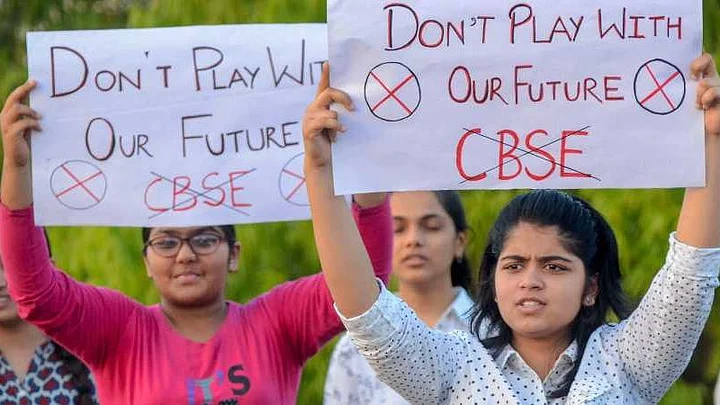In a step that assumes added significance during the ongoing elections, the Central Board of Secondary Education (CBSE) has decided to scrap chapters on ‘democracy and diversity’ from the Class 10 social science syllabus for the 2019-2020 session.
The three chapters cut from the syllabus – ‘Democracy and Diversity’, ‘Popular Struggle and Movements’ and ‘Challenges to Democracy’ – will be “assessed in the periodic tests, but will not be evaluated in the board examination,” CBSE said in a statement.
This move, as per the Board, has been taken as a part of the ‘curriculum rationalisation exercise’ that has been undertaken by the Human Resource Development Ministry and will help “reduce the burden and pressure of the curriculum on the students”.
But given the contents of the chapters and the timing of the move, CBSE’s rationalisation seems to lack depth.
No Chapters Deleted: CBSE
Responding to various reports on the three chapters being cut from the syllabus, CBSE reiterated in a statement that, “no chapters have been deleted from the syllabus of Social Science Class 10 by the Board. All the chapters will be studied by the Class 10 students in due course of time and also evaluated.”
“The mentioned chapters namely, Democracy and Diversity, Popular Struggle and Movements and Challenges to Democracy can best be understood through project work and experiential learning and similarly best assessed through different modes in addition to pen paper tests,” the board added.
However, it remains to be seen how these chapters – cut to help ‘relieve’ the overburdened students – are emphasised on enough, given that they will not be a part of the Board exams.
CBSE Overstep?
Several academics and teachers are of the opinion that the decision is not right and is an overstep by the CBSE.
Professor Satvinderpal Kaur of the department of education, Panjab University, was quoted as saying by Hindustan Times: “Chapters such as ‘popular struggle’ and ‘movements and challenges to democracy’ have their own importance in making of the child understand past struggles. The child’s knowledge of these topics must be holistically evaluated. What is being done is not healthy and will have a harmful long-term effect.”
While, Krishna Kumar, former NCERT chairman, feels that the CBSE is taking away the flexibility from the textbooks.
“The NCERT should be the body that should decide the curriculum. However, CBSE is calling the shots,” he said, as per the report.
The NCERT’s track-record, however, is not clean either. It has, recently and in the past, also removed crucial chapters on democracy, caste struggles and colonialism.
NCERT No Better Than CBSE
The government-run National Council for Educational Research and Training (NCERT), walking in line behind the CBSE, has decided to drop a full chapter – ‘Democracy in the Contemporary World’ – from the political science textbook for Class 9.
According to a report in The Wire, the new textbook fails to mention why the chapter has been removed.
To make things worse, the report adds, the decision was taken by a committee within NCERT that had no expert.
Historian Hari Vasudevan, who headed the advisory committee for NCERT textbooks in 2005, was quoted by the news portal as saying: “The arbitrariness and wilfulness do not send a right message at the time of elections. Moreover, it is about removing the chapter on democracy.”
This comes a month after the body had dropped three chapters from its Class 9 history textbook, including one on caste conflict and struggles of the so-called ‘lower caste’ Nadar women of Travancore, who were forced to keep their upper bodies uncovered, as per The Indian Express. This was the second textbook review undertaken by the incumbent government.
‘Changes Made Democratically’
NCERT director Hrushikesh Senapathy, meanwhile, said that the decision to drop the chapter had been a democratic one.
He told The Wire: “Changes have been made in a democratic way. We had asked for public opinion and received one lakh suggestions from 27,000 people. A curriculum committee within the NCERT then analysed it and carried out the changes.”
However, he refused to answer why the authors of the book were not consulted before its contents were altered.
‘End of Democracy?’
Twitter users were quick to slam the education board for its decision as they felt it was against the essence of democracy.
(With inputs from Hindustan Times, The Indian Express and The Wire)
